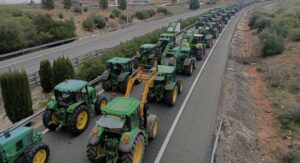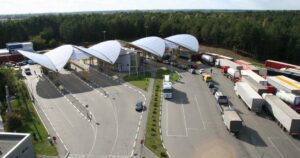
In Montenegro, a group of employees of Željeznička infrastruktura Crne Gore (ŽICG) — more than 80 station attendants and dispatchers — announced a work stoppage, which led to the suspension of several trains at the Podgorica, Bar, and Bijelo Polje, according to the Serbian Economist Telegram channel.
According to the publication, a train traveling from Belgrade to Bar has already been stopped, and a train from Bijelo Polje has not continued its route; some passengers are being transported to their destinations by bus.
A representative of the group of workers, Andrej Kaludjerovic, said that the stoppage was linked to a demand that ŽICG management begin negotiations on raising wages and equalizing pay rates with other railway companies in the country.
According to him, the labor action will continue until management invites employee representatives to the negotiating table with the participation of two representative trade unions, the Ministry of Transport, and the chairman of the company’s board of directors.
Source: Serbian Economist.

On Friday, Italian citizens went on a general strike demanding higher wages and increased investment in the social sphere, ANSA reports. Employees of the public and private sectors intend to strike for eight hours.
In the transportation sector, by order of Italian Minister of Infrastructure Matteo Salvini, the strike will be limited to four hours. Thus, water transport, buses, subways and trams will stop working from 09:00 to 13:00 local time (10:00 to 14:00 Kyiv time). Air traffic will be suspended from 10:00 to 14:00 local time (11:00 to 15:00 Kyiv time). Firefighters will also not work during this time period.
However, the strike will not affect rail services. A total of 43 protests are planned throughout Italy on Friday. The day before, the Italian Labor Union and the General Italian Labor Confederation called on citizens to go on strike to demand higher wages, increased funding for healthcare, education, public services, and investment in industry.
According to various estimates, there are about 1 million Ukrainian citizens in Italy.

The Screen Actors, Television and Radio Artists Union (SAG-AFTRA) went on strike Friday, following screenwriters after negotiations for a new contract with studios and streaming services collapsed.
Hollywood’s two major unions are striking at the same time for the first time since 1960, when Ronald Reagan was president of the Screen Actors Guild, MarketWatch notes.
SAG-AFTRA, whose members include 160,000 movie actors, journalists, announcers, presenters and stuntmen, and the Alliance of Motion Picture and Television Producers (AMPTP), which represents employers including Disney, Netflix and Amazon, failed to reach an agreement after the previous three-year contract expired.
During negotiations, the Screen Actors Guild demanded a number of issues be addressed, including low wages, the need to shoot video auditions at their own expense and the unregulated use of artificial intelligence.
The AMPTP said it offered the Guild a favorable agreement that included the largest minimum wage increase in 35 years, an increase in pension and health contribution limits, and an “innovative solution” to artificial intelligence that would protect actors’ rights to use their digital image.
“Unfortunately, the union has chosen a path that will lead to financial hardship for thousands upon thousands of people involved in the film industry,” the alliance said in a statement.
According to the rules of SAG-AFTRA, during the strike actors can not participate in film production, including shooting, auditions, rehearsals and voice-overs, as well as attend premieres and in any way promote projects with their participation. The current bans call into question the actors’ appearance at the 75th ceremony of the prestigious Emmy Awards, which will be held in September.
Earlier, the writers’ strike halted work on the show “Saturday Night Live” as well as several TV series, including “Very Strange Things,” “Sly and Family Guy.” The number of paused TV shows and movie projects is expected to increase following the breakdown in negotiations between SAG-AFTRA and AMPTP.

Romanian farmers are threatening to launch a large-scale nationwide nationwide protest on June 7 if authorities do not ban the transit and import of grain from Ukraine from June 15, 2023, to March 15, 2024, the Alliance for Agriculture and Cooperation (AAC) reported.
“As a measure to protect the activities of farmers and the agri-food sector, we ask President Klaus Johannis, the prime minister, the heads (of the local parties PNL and PSD – IF) Nicolae Ciucă and Marcel Ciolacu, (Minister of Agriculture) Petra Daea to represent Romanian interests more firmly and to take all legal steps and diplomatic measures that are imposed to prohibit the transit and import of agricultural products from Ukraine in the period from June 15, 2023 to March 15, 2024,” AAS adevarul. ro.
The Alliance notes that the agricultural market is “severely distorted to the detriment of Romanian farmers.” It argues that in 2023, most farmers will be forced to close their farms because of the high costs of growing crops, and the prospect of selling products at prices below cost “even under good production conditions will not save them.
The ACC appeal stresses that the EUR10 million allocated by the European Commission to Romania to mitigate losses is insignificant. “These funds can at most be redirected to restore, at least partially, the road infrastructure damaged by the intensive transit of Ukrainian goods,” the ACC believes.
The member organizations of the Alliance for Agriculture and Cooperation – AAC, National Federation PROAGRO, League of Agricultural Producers’ Associations from Romania – LAPAR, Union of the National Chapter of Vegetable Sector Cooperatives – UNCSV and Forum of Professional Farmers and Processors from Romania – FAPPR, together grow crops and raise livestock on more than 4.7 million ha. In its ranks are more than 56.5% of those employed in the agricultural sector and 20% of the food industry in Romania.
In Poland, as well as in Slovakia, the Czech Republic, Hungary, Romania and Bulgaria, last week there were protests by agricultural producers against increased grain shipments from Ukraine, for which Brussels temporarily lifted duties.

German residents were moving more actively around the country on Sunday, many domestic trains were jammed with passengers as people sought to get to their desired destinations before a major strike by transport workers began, Western media reported.
On Monday, March 27, many transport workers, from railroad workers to airport and public transport employees in cities, are expected to take part in a nationwide strike. This strike is expected to halt traffic in the country for a day.
German trade unions have called on thousands of transport workers to take part in the strike and to demand higher wages – to cope with high inflation. Thus, in the trade union Verdi said that they had appealed to go on strike to 120 thousand people and in the EVG union that protects the rights of railway workers in Germany – to 230 thousand people.
The unions are seeking to raise the wages of the transport industry employees by 10-12%, but at the moment, the employers offer a phased increase of 5% and a one-time payment of about EUR2.5 thousand.
Meanwhile, on Sunday, the day before the strike, Munich Airport was already closed, flights were also cancelled or delayed in Germany’s largest airport – Frankfurt am Main Airport.

Truck drivers blocked the road at the Polish checkpoint Yagodin-Dorogusk and went on strike demanding to improve the work of the Polish phytosanitary and veterinary control, said Deputy Minister of Infrastructure of Ukraine Mustafa Nayem.
“Polish drivers put forward three demands: speed up phytosanitary and veterinary control and transfer the service to a round-the-clock mode of operation,” he wrote on Facebook on Monday.
According to Nayem, every hour drivers let 2 cars pass: 1 with goods and 1 empty.
He clarified that 2,650 trucks are now waiting on the border with Poland in front of the Yagodin checkpoint to leave Poland, while 300 trucks are waiting to enter Ukraine. At the same time, the line for the last day has increased by 8 km and reaches 53 km.
Naem stressed that the cause of the strike was the indifference of the Polish authorities and the pretense that “nothing is happening.”
According to the Deputy Minister of Infrastructure, before the war, up to 80 trucks per day passed control, and in recent days – from 12 to 25.
“If there are objective reasons for such a slowdown, then we are ready to do everything in our power to speed up the process and increase the throughput of the checkpoint. But at the same time, we expect the same progress from all services on the Polish side,” Nayem said.
He added that the striking Polish drivers also want empty vehicles to leave Ukraine for Poland out of turn.
At the same time, the Deputy Minister stressed, it is also extremely important for Ukraine that goods leave the country for export as soon as possible.
“We have to export our products. Our carriers have to cross the border in a normal time. Because when they wait 7-10 days in line, they lose about 400 euros per car every day. In a week in line, the carrier loses more than just money , but any point in working at all,” Nayem said.
According to him, the problem of many days of idle time of carriers at the entrance to Poland should be solved by the establishment of round-the-clock phytosanitary and veterinary control.
In addition, the Deputy Minister stressed that there is no talk of abolishing the “transport visa-free regime”. “Most likely, this is a political demand of Polish carriers. The goal is to put additional pressure on the Polish government to solve the above problems,” Nayem said.
The day before, he said that the Ukrainian side repeatedly, at many closed, open, joint and bilateral meetings offered the Polish side a simple solution – to increase the number of employees of phytosanitary and veterinary services, to provide Ukrainian experts who would help Polish colleagues, or to remove this control beyond the points passes inland. However, the situation is only getting worse.